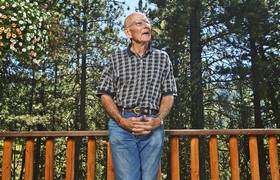forum
library
tutorial
contact

Dam Breaching gets Surprise Endorsement
by Rocky BarkerTidepool: Voices, August 17, 2005
|
the film forum library tutorial contact |

|
Dam Breaching gets Surprise Endorsementby Rocky BarkerTidepool: Voices, August 17, 2005 |
Support for breaching Snake River dams hits new high
 When Don Chapman, a biologist and longtime consultant for the hydro industry in the Pacific Northwest, suddenly said four dams in Washington needed to be breached to save Idaho's salmon, it shook the region.
When Don Chapman, a biologist and longtime consultant for the hydro industry in the Pacific Northwest, suddenly said four dams in Washington needed to be breached to save Idaho's salmon, it shook the region.
Until now, Chapman had staunchly defended technological fixes for hauling salmon from their spawning grounds past the dams to the Pacific Ocean.
The former University of Idaho professor, called the "guru" of fisheries biologists, said he changed his mind because of new evidence of warming in the Columbia River. Warming will make the river more deadly for salmon, Chapman said, reducing the habitat needed for spawning and even causing the North Pacific to lose much of its productivity.
So far, none of the region's scientists have chosen to refute his new position. Politically, there has never been much support for breaching the four lower Snake River dams.
Meanwhile, one group sees Chapman's turnabout in the context of the "Star Wars" saga: A hero arises, he falls like Darth Vader, then when he's needed most he abandons the dark side to save the day. That group is his former students at the University of Idaho, who, in the 1960s, went on to major jobs managing salmon and steelhead. As a professor, Chapman instilled a sense of idealism into his students, encouraging them to be advocates for fish and their habitat.
"He was our knight in shining armor," said Steve Pettit, a retired Idaho Department of Fish and Game biologist, and a former student.
Then, in 1979, after a stint helping native people in Tanzania and Colombia to develop sustainable fisheries, Chapman left the university to work as a fisheries consultant for the Northwest's electric power utilities.
His former students, who had become fisheries managers in Oregon and Idaho, pressed federal and public-utility hydroelectric dam operators to make their dams less deadly for migrating salmon. Over the years, they saw that as eight dams between the Pacific and Idaho were completed, salmon numbers plummeted. Dam operators had developed a system to collect young salmon as they reached the dams. They loaded the fish into trucks and barges, then shipped them downriver to the estuary below Bonneville Dam, near Portland. But state and tribal biologists never considered it sufficient.
Chapman, however, believed the system was enough to keep the fish from going extinct. He was well-paid for his opinion.
His former students said they'd find themselves sitting in court, testifying under cross examination from a utility attorney. Whispering into the lawyer's ear would be Chapman, providing just the right question that illuminated the weakness or uncertainty of the biologist's point.
"It was pretty intimidating," said Frank Young, fish and wildlife coordinator for the Columbia Basin Fish and Wildlife Authority. "You can't help but feel betrayed."
In 1999, the Idaho Section of the American Fisheries Society voted overwhelmingly that breaching the four dams was the best -- and perhaps the only -- way to save the endangered salmon that spawned upstream. Chapman was among the small minority who refused to go along.
"I know what they say -- 'he's gone over to the dark side,'" Chapman said at the time. "I'm straight with myself, straight in my mind that I've acted professionally."
Fast-forward to 2005; Chapman has all but retired. He continues to write, co-authoring a recent book for the National Research Council of the National Academies of Science.
He filed a statement on behalf of the public utilities, critical of the plan to spill additional water over the dams this summer to help fall chinook migrate. Chapman said he still thinks barging the fish would be safer, but Judge James Redden, who ruled against the Bush administration's salmon plan, disagreed.
Then came the news about a warming river and Chapman, most recently, deciding that this overwhelms all the old arguments. Chapman hopes this fact will spark a renewed debate among the scientists he respects on all sides of the argument. He knows he's moving out of the scientific realm and into the political arena.
"After 50 years in fisheries, I take that privilege," he said.
Science isn't about accepting the majority opinion, Chapman reminds us. It's about peer review and scientists defending their hypotheses with research and data. But as always, it is our values that drive our politics and influence any conclusion we come to about the worth of dams vs. the worth of salmon.
learn more on topics covered in the film
see the video
read the script
learn the songs
discussion forum
